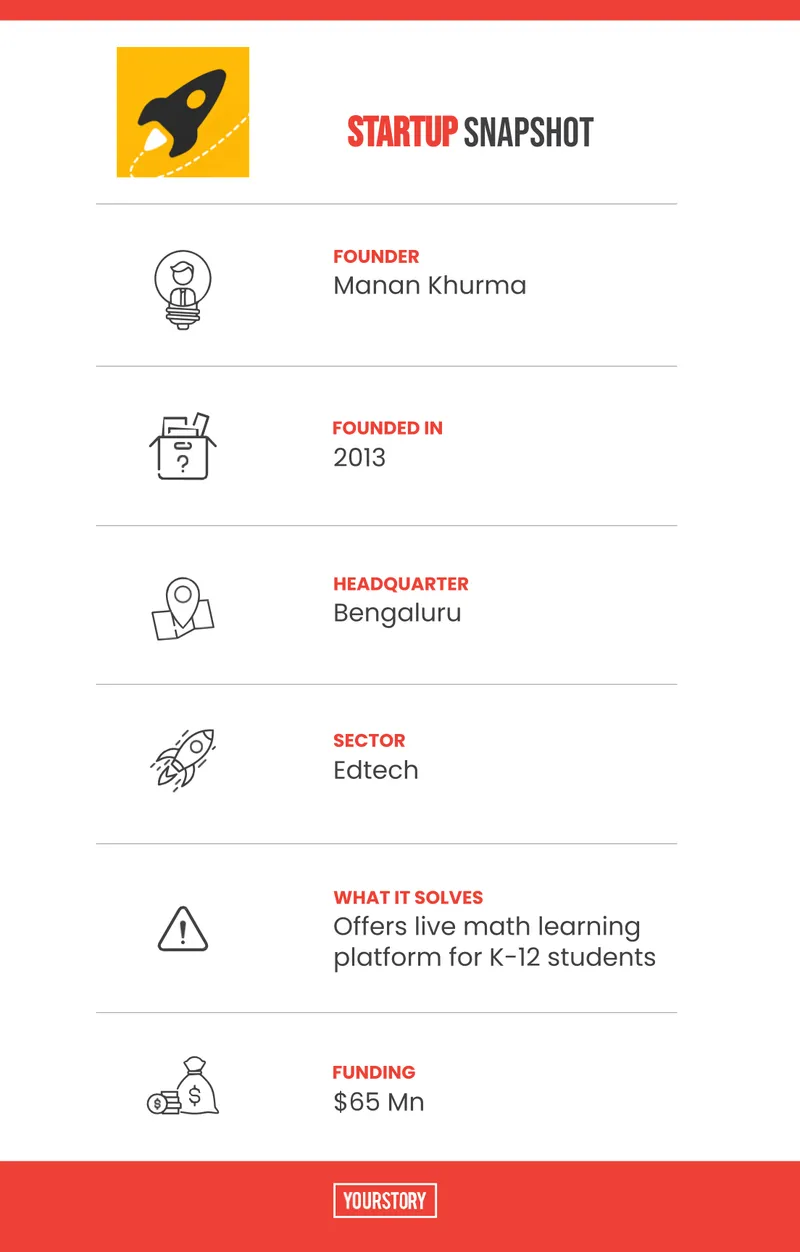Inside Cuemath’s global expansion: How the Google-backed edtech startup aims to reach $100M revenue, 1B math minds in 50 countries
Afterschool math learning startup Cuemath wants to reach one billion students by the end of FY22. Backed by marquee VCs like Sequoia, CapitalG, Alpha Wave Incubation, Lightstone Aspada, and others, it has a new CEO and an ambitious plan to become a “global math brand".
There’s a lot happening at lately.
Besides doubling growth and raising multiple rounds of funding in the last fiscal, the afterschool math learning startup is streamlining operations in India, setting up an office in Abu Dhabi, and building cross-country teams in the US, the UK, and other international territories to drive global expansion.
Now a Series C startup, Cuemath plans to expand to 50-odd markets (up from 20 at present) by the end of FY22. Earlier in September, the Bengaluru-based startup appointed ex-Swiggy COO Vivek Sunder as CEO to drive its global growth strategy.
A tech veteran, Sunder has been credited with expanding Swiggy’s geographical reach to 500 cities. So, he knows a thing or two about building scale.
With his appointment, Cuemath Founder (and former CEO) Manan Khurma will assume the role of a Founder-Chairman to focus on the pedagogy and curriculum aspects of the business, while Sunder will drive the eight-year-old company’s vision of becoming a global math brand and market leader in vertical learning.

Cuemath's newly appointed CEO Vivek Sunder
“I am confident that his [Vivek’s] proven track record and extensive experience in building consumer brands, coupled with a laser focus on industry-leading operational practices, will drive and extend Cuemath's upward trajectory and become a leader in global math education," Manan said on the appointment.
Cuemath’s primary goal is to reach a revenue rate of $100 million, up from $50 million currently. “We will reach there in the first half of next year,” says the founder.
The pandemic-led growth story
Besides additions to the senior management, Cuemath has also witnessed good traction in the last 15 months of the pandemic as millions of K-12 students have started learning online. Even though there’s talk of schools reopening in some parts of India, the imminent third wave has ensured that teaching is still digital-first.
Cuemath claims to have served more than 200,000 paying subscribers in 20 countries, including India. In 2021 alone, it has delivered four million hours of live math classes — that is, four million out of a total of 10 million hours since Cuemath pivoted to online learning in 2017 (from a primarily offline home-based tutoring model earlier).
Manan tells YourStory, “Between 2014 and 2017, our product was tech-based but the delivery of education was offline. Online accounted for less than 10 percent of our revenues before the pandemic. But we were able to build a stable and high-performing tech platform during the lockdown. We trained our entire teacher base (4,000) and shifted them online. Teachers and students have separate apps and the business has taken off spectacularly. In the last 18 months, we have also started expanding outside India.”

Manan Khurma, Founder & Chairman, Cuemath
International markets contribute to over a third of Cuemath’s business today. Its goal is to increase that share because the product can be priced higher outside India, which will have a direct impact on company revenues and teacher payouts.
The founder shares,
“Typically, Indian students pay Rs 2,000 for eight classes a month. In the US, it’s $100 for a monthly subscription. Even though India is our main market, the US is the fastest-growing market in terms of users.”
Interestingly, because of its exposure to non-Indian markets, Cuemath also saw a significant rise in users on its web-only learning platform, Cuemath Leap. Overall, the platform’s user retention rate is eight out of 10 students (80 percent) today. “Half of all new admissions happened via referrals, which is a strong metric for us,” Manan says.
When it comes to teacher payouts, Cuemath claims some of its top tutors “earn full salaries upwards of Rs 1.5 lakh a month” and are fully committed to the job.
Manan elaborates, “We’re not in the business of recruiting ‘star’ teachers like does. So, our compensation structure and incentives are different. We look at people who have a good math background and a great deal of empathy. Our teacher selection rate is 3 percent and they do this job full-time.”

Cuemath has delivered 10 million hours of live classes through its math learning platform
Solving learning loss with tech
Cuemath recently conducted a joint study with Nielsen to ascertain the impact of the pandemic on math learning in early K-12.
The findings reveal that one in every four students up to Grade V has faced “severe learning loss” (gaps in coaching) in math in the past 18 months. And 50 percent of parents believe that “learning loss leads to forgetting basic concepts and the inability to grasp fundamentals between Grade I and Grade V”.
Additionally, 25 percent of the parents of higher-grade students were of the view that “geometry and mensuration have become difficult to comprehend, indicating a weaker foundational understanding of math.” The study also highlighted that 44 percent of parents reported fear of math as a prominent factor for learning loss.
While the survey was restricted to the top six metros, Cuemath believes this trend is likely to be mirrored across India. It also sees this as a significant growth opportunity even in a post-pandemic scenario after schools reopen and physical classrooms return.
Manan says, “Math has predominantly been directed rather than self-taught. With schools shut due to COVID-19, students’ progress has fallen sharply. This cumulative loss of learning in children will invariably have a critical impact on their future. Going forward, the school syllabus will need to be supplemented by smart teaching methods offered by edtech platforms.”

Cuemath wants to onboard 11,000 math teachers by FY22
To reduce learning loss, Cuemath launched a one-year free access programme earlier this month. It is also on the lookout for government partnerships to extend the programme to underprivileged children to help address inequalities in learning.
While the basic curriculum will be free for students globally, to avail 1:1 live tutoring, they will have to pay $16 per class. Cuemath wants to create “one billion math minds” through the programme.
The founder shares, “Once the [pandemic-led] hype and heat settles down, it will boil down to which players are able to create the best learning outcomes. Word of mouth spreads only via outcomes. Many edtech players are spending marketing dollars to acquire users at scale. But you will have to create systems that will personalise each learning experience for millions of learners. It’s a deep problem to solve.”
Cuemath’s strategy to win the market is through a “far more tech-driven play”.
“We want to evolve into an intelligent system so that each student learns at a different pace and style. We’re also actively looking at acquiring companies that have already solved the problem with AI and ML,” Manan adds.
Flush with venture capital
Like most established edtechs, Cuemath’s cap table has many marquee investors.
It raised its first round (Rs 1 crore) of funding from Unitus Seed Fund back in 2014. Two years later, Sequoia India led a $4 million Series A round in the startup.
Sequoia and Alphabet-owned CapitalG led a Series B round of $15 million in 2017, shortly before Cuemath pivoted to an online coaching model. In 2019, it went on to raise $5.5 million in an extended Series B round led by Manta Ray Ventures.

Abheek Anand, MD, Sequoia Capital India said at the time of funding,
“The most exciting aspect of the Cuemath programme is how the unique technology and learning system inspire a love for mathematics in children from a very young age. Manan and the team have spent years perfecting a new way of teaching math to young children and delivering it through a unique partner model.”
In 2020, with edtech booming across the world, Cuemath raised three rounds of funding — undisclosed venture debt from Trifecta Capital, which also invested $2.9 million in a follow-on Series B round; and a Series C round of $40 million led by LGT Lightstone Aspada and Alpha Wave Incubation in December. The Series C round (its largest so far) closed in February 2021, as edtech continued to attract top dollars.
Manans says, “Indian edtech is the fastest growing in the world in terms of capital deployment. We intend to raise another round north of $100 million in six months to fund expansion into new markets and consider potential acquisitions.”
Future roadmap and competitive landscape
In the next three to six months, Cuemath plans to double its 1,100-strong team as it enters international markets. “Partnerships are one of the reasons we are building teams in other countries,” Manan reveals.
“But we don’t want to create a massive sales army. We want to be conservative because outside India, it is hard to sell a push-based product. Parents are far more driven to try out a service on their own. As the industry matures, you will see movement away from push-based sales to pull-based strategies,” he explains.

Cuemath wants to become a global brand in the $20 billion math learning market
Will contextualisation in global markets be a challenge? Manan doesn’t think so.
He says, “Math is universal across the world. There’s a huge degree of overlap in curriculums. However, we can always create custom curriculums on the fly.”
The company believes that it doesn’t have any direct competitor in India because it is “building a vertical play” in a market largely dominated by horizontal players such as , , , and others.
However, new-age vertical platforms like Countingwell, , , Microsoft Math Solver, , , , etc are now heating up the $20 billion global math learning market.
Investors reckon vertical learning will drive the next wave of edtech. “BYJU’S is doing to edtech what did to ecommerce back in the day. But the Nykaas [vertical plays] of edtech are yet to play out,” a leading VC told YourStory earlier.
Indian startups, Manan believes, have an edge over others when it comes to building a global math brand. “There’s a general sentiment that Indians are good at math. Also, we have a neutral English accent that is well-understood everywhere. So, even with tutors from only India, you can build a curriculum for the world. Some of the best math people in the country are working for us,” he says.
Even though Cuemath isn’t exploring international tutors in the medium-to-short term, if that is what it takes to “win the global math market”, then it will... in future.
YourStory’s flagship startup-tech and leadership conference will return virtually for its 13th edition on October 25-30, 2021. Sign up for updates on TechSparks or to express your interest in partnerships and speaker opportunities here.
For more on TechSparks 2021, click here.
Edited by Kanishk Singh











